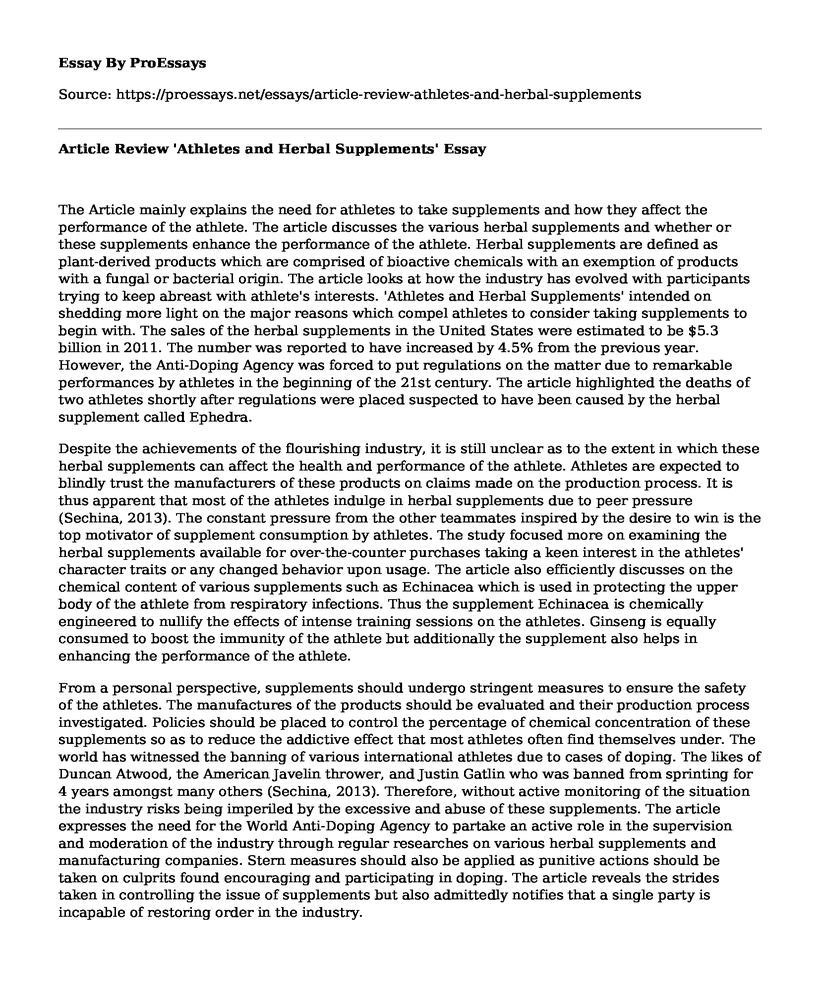The Article mainly explains the need for athletes to take supplements and how they affect the performance of the athlete. The article discusses the various herbal supplements and whether or these supplements enhance the performance of the athlete. Herbal supplements are defined as plant-derived products which are comprised of bioactive chemicals with an exemption of products with a fungal or bacterial origin. The article looks at how the industry has evolved with participants trying to keep abreast with athlete's interests. 'Athletes and Herbal Supplements' intended on shedding more light on the major reasons which compel athletes to consider taking supplements to begin with. The sales of the herbal supplements in the United States were estimated to be $5.3 billion in 2011. The number was reported to have increased by 4.5% from the previous year. However, the Anti-Doping Agency was forced to put regulations on the matter due to remarkable performances by athletes in the beginning of the 21st century. The article highlighted the deaths of two athletes shortly after regulations were placed suspected to have been caused by the herbal supplement called Ephedra.
Despite the achievements of the flourishing industry, it is still unclear as to the extent in which these herbal supplements can affect the health and performance of the athlete. Athletes are expected to blindly trust the manufacturers of these products on claims made on the production process. It is thus apparent that most of the athletes indulge in herbal supplements due to peer pressure (Sechina, 2013). The constant pressure from the other teammates inspired by the desire to win is the top motivator of supplement consumption by athletes. The study focused more on examining the herbal supplements available for over-the-counter purchases taking a keen interest in the athletes' character traits or any changed behavior upon usage. The article also efficiently discusses on the chemical content of various supplements such as Echinacea which is used in protecting the upper body of the athlete from respiratory infections. Thus the supplement Echinacea is chemically engineered to nullify the effects of intense training sessions on the athletes. Ginseng is equally consumed to boost the immunity of the athlete but additionally the supplement also helps in enhancing the performance of the athlete.
From a personal perspective, supplements should undergo stringent measures to ensure the safety of the athletes. The manufactures of the products should be evaluated and their production process investigated. Policies should be placed to control the percentage of chemical concentration of these supplements so as to reduce the addictive effect that most athletes often find themselves under. The world has witnessed the banning of various international athletes due to cases of doping. The likes of Duncan Atwood, the American Javelin thrower, and Justin Gatlin who was banned from sprinting for 4 years amongst many others (Sechina, 2013). Therefore, without active monitoring of the situation the industry risks being imperiled by the excessive and abuse of these supplements. The article expresses the need for the World Anti-Doping Agency to partake an active role in the supervision and moderation of the industry through regular researches on various herbal supplements and manufacturing companies. Stern measures should also be applied as punitive actions should be taken on culprits found encouraging and participating in doping. The article reveals the strides taken in controlling the issue of supplements but also admittedly notifies that a single party is incapable of restoring order in the industry.
The article gives a clear description of how herbal supplements affect the performance of athletes and the composition of the various supplements offered. Comparing with Neil Mathews' 'Prohibited Contaminants in Dietary Supplements' the article was concise and clear elaborating the exact extent of the matter and how the whole sporting industry has been placed at jeopardy. Analyzing Mathew's article, there is less information provided on both the types of the supplements and chemical compositions of these supplements and the adverse effects on the athletes. I would thus consider and recommend the article for its credibility and how extensive the topic is covered. The author demonstrated a clear understanding of the subject and presented original facts on the developments made to curb the abuse of the herbal supplements.
References
Mathews, N. M. (2017). Prohibited Contaminants in Dietary Supplements. Sports Health: A Multidisciplinary Approach, 10(1), 19-30. doi:10.1177/1941738117727736.
Senchina, D. (2013). Athletics and Herbal Supplements. American Scientist, 101(2), 134. doi:10.1511/2013.101.134.
Cite this page
Article Review 'Athletes and Herbal Supplements'. (2022, May 09). Retrieved from https://proessays.net/essays/article-review-athletes-and-herbal-supplements
If you are the original author of this essay and no longer wish to have it published on the ProEssays website, please click below to request its removal:
- Evidence-Based Interventions on Vaccine Hesitancy
- Nursing Professional Statement Example
- Getting Better Sleep Essay
- Essay Sample on Mixed Anxiety/Depression & Substance Use: Effective Diagnosis & Treatment
- Vaping: Pros, Smells, & Odors Eradicated - Essay Sample
- Essay Example on Nurses Leverage Simulation Tech to Educate Patients on Body Anatomy
- Covid-19: US Battle for Socio-Economic and Political Stability - Essay Sample







